BEND, Ore. – America’s most popular type of electric transportation in 2022 was not a car, it was bicycles. Electric bike sales surged past 1.1 million last year, up from 880,000 the year before. There were only about 800,000 electric cars, SUVs and trucks sold last year. At the same time, e-bikes are expected to eclipse traditional bicycle sales by 2027.
There are many reasons for their popularity, especially among those who live in a place where commuting or errand-running on a bike is possible. Electric mountain bikes are also extremely popular, however. Quite simply, they allow you to easily enjoy the downhill and flat bits without the pain and sweat of the uphill ones.
There is an issue, however, especially for mountain bikers who typically must transport their e-bike someplace rugged to ride it: They are very heavy. Even a high-end, lightweight and expensive e-bike like a Specialized Turbo Levo SL is pushing 40 pounds, which exceeds the weight capacity of many bike racks. The Gazelle Ultimate C380+ I recently tested weighs 55 pounds (pictured below and throughout this article).
But wait, you might be asking, my two-bike rack can apparently hold 70 pounds. Why can’t I just put one 55-pound bike on it? I had that same question, so I reached out to the engineers at Yakima.
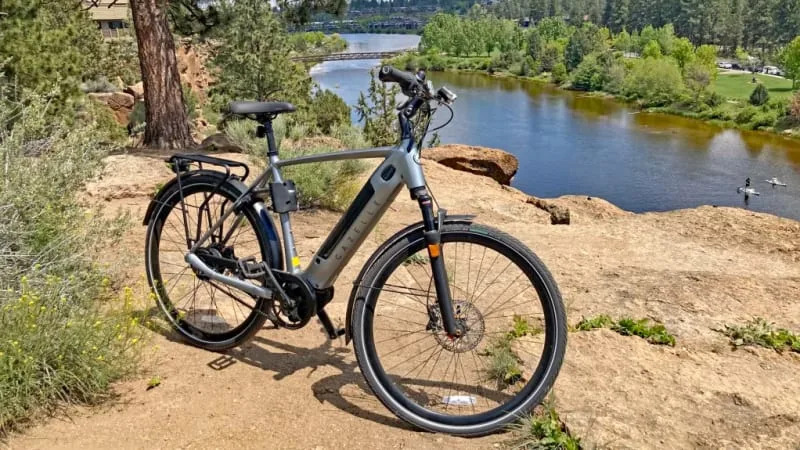
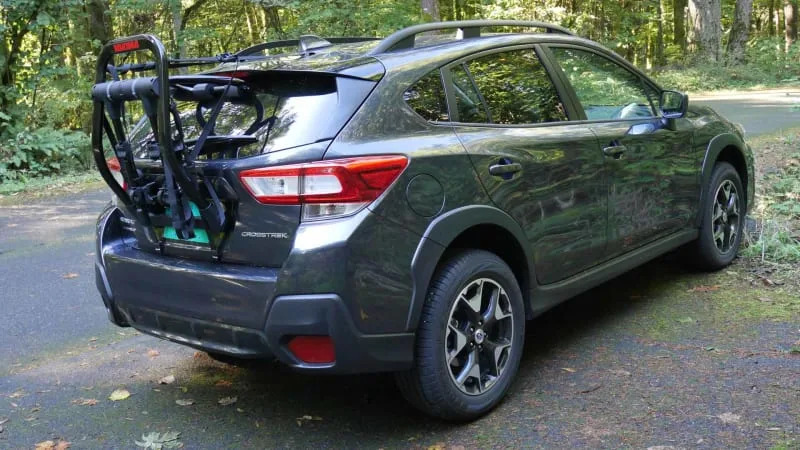
“Each (bike) tray was tested and we can’t safely say that a bike exceeding the per-bike limit would be OK,” a company spokesperson conveyed to me. “Often times it isn’t the entire system that fails during our testing, but one small part or piece of a tray.”
As such, even though my liftgate-mounted Yakima Full-Back 2 (pictured above) can carry two bikes at 35 pounds apiece and therefore 70 pounds, I can’t use it for the 55-pound Gazelle. I also wouldn’t be able to use the Yakima Exo Double Up I reviewed two years ago – it topped out at 50 pounds when mounted on the bottom or 40 on the top deck (though perhaps if I removed the Gazelle’s battery it would be fine).
In short, you’ll need to look closely at your existing rack’s specifications when buying an e-bike you’ll need to transport, or look closely at rack specifications when buying a new one. Luckily, rack makers such as Yakima, Thule, Küat and others are increasingly developing racks capable of carrying heavy bikes.
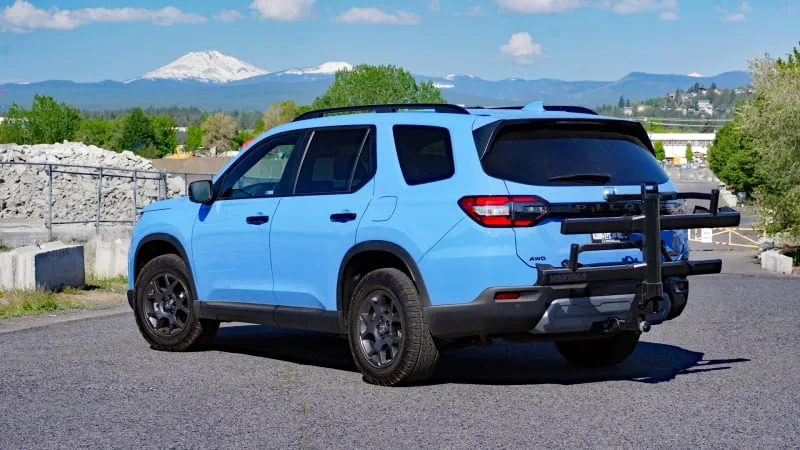
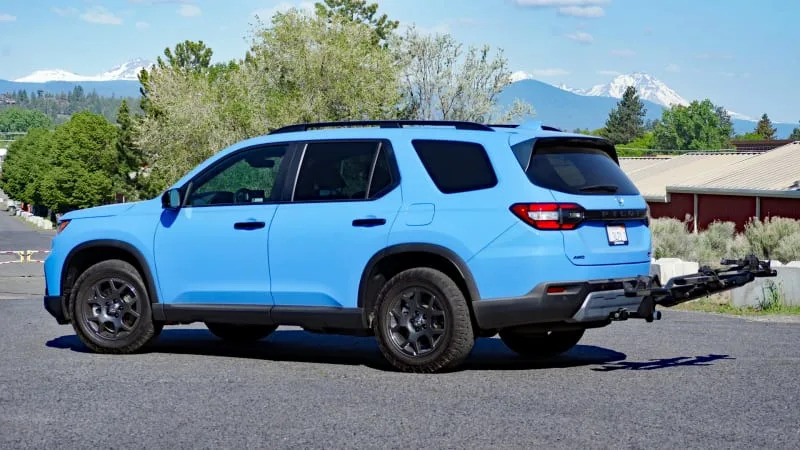
For my recent outdoor adventuring road test to Oregon featuring the Honda Pilot TrailSport, I wanted to bring along an e-bike since, as described above, they’re becoming an increasingly popular part of outdoor adventuring. The Gazelle would be the e-bike for the journey, but to get it there I would need one of those more robust racks. Per usual, I turned to my fellow Oregonians at Yakima and their new StageTwo hitch-mounted rack. It’s capable of holding two bikes weighing 70 pounds apiece. It also accommodates bikes with wheelbases up to 52 inches, though even that weight and wheelbase capability isn’t enough for something like a Radpower RadWagon 4 that’s so popular among parents in bike-friendly places like my road trip destination of Bend, Ore.
According to Yakima, the StageTwo wasn’t originally intended to carry e-bikes. It was originally designed to carry three conventional bikes, but when the company made the decision to have it carry only two, they didn’t change the spine’s strength. Engineers put the new version back through their testing process and found it could safely carry heavier bikes.
And that it did when loaded into the hitch of my Honda Pilot TrailSport test vehicle. The rack arrives unassembled in a very sturdy and very heavy box. The total rack weighs 66 pounds. The prime weight offender is the primary spine/tongue that plugs into your hitch: it’s a serious piece of equipment. Each bike platform consists of two pieces that slide onto the spine and must be screwed in using Yakima’s proprietary tool. The instructions give a specific torque setting, but there’s no way of actually measuring that with the tool provided. Funnily enough, my forearm also lacks a torque readout. Putting it all together is easier than I anticipated, though it does take some muscle and one review I read said the process was “laborious” compared to other racks. At the very least, having a second person around wouldn’t be a bad idea.
That said, once constructed, attaching it to your vehicle couldn’t be easier. Push the rack’s tongue into the hitch, pop in a safety pin, and turn the knurled metal knob while wiggling the tongue. That’s it. You then lock the knob with the rack’s single key that also locks the bike-locking cable (there is also a very sturdy, welded loop for attaching stronger locks).
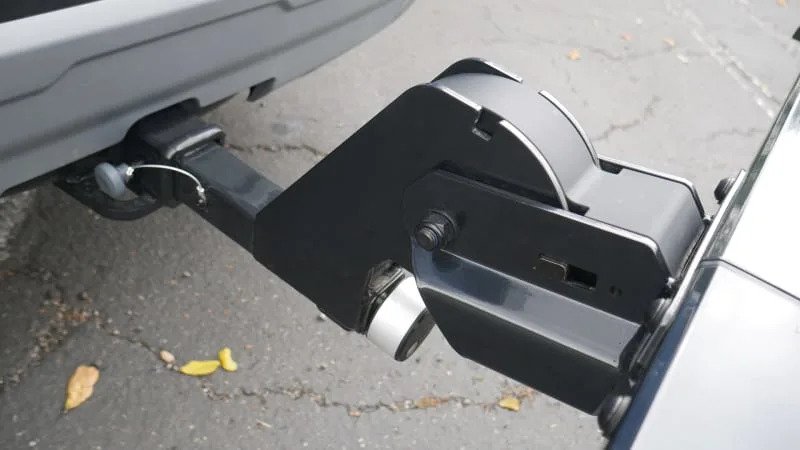
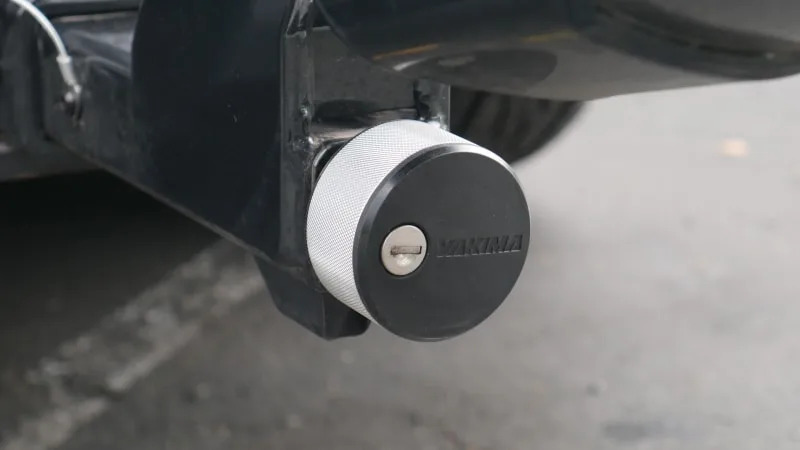
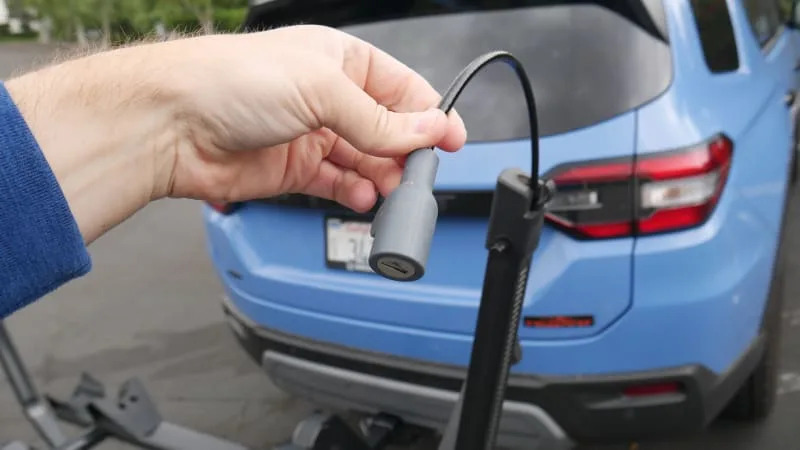
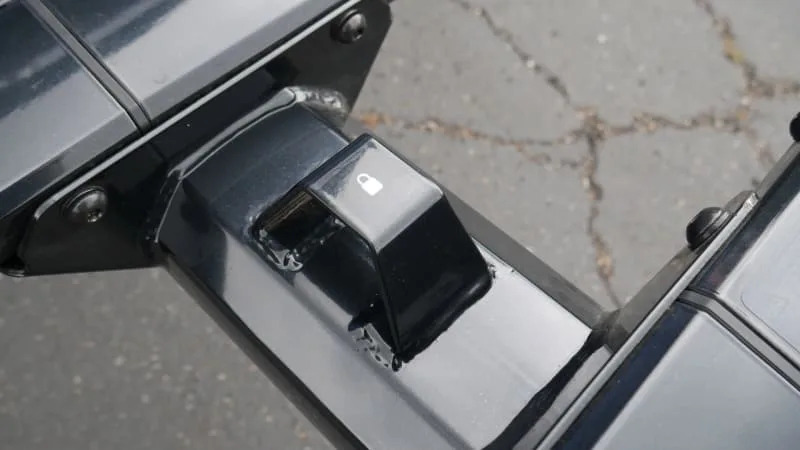
Things get harder again when you have to hoist a bike onto the platform, because you know, we’re talking about something 55 pounds or more that’s inherently awkward. You obviously don’t want to damage the bike, your SUV/truck or yourself. The height of our vehicle’s hitch also comes into play, and a Honda Pilot TrailSport has hardly one of the highest hitch points out there.
Securing it is technically easy enough, but you do have to balance the bike with one arm while swinging the supporting arm over the tire and then pushing the hook down into the tire. Once that’s done, you secure the rear tire with a sturdy plastic strap that has teeth to lock it into place. Yakima instructs putting the heavier bike (or only bike) on the platform closer to the vehicle.
Like most hitch-mounted racks, this one folds up against the liftgate/tailgate when not in use so you’re not uselessly adding a couple of extra feet onto your vehicle’s overall length. The StageTwo, however, also drops down so you don’t have to take your bike(s) off when accessing the cargo area. I can’t underline how helpful this feature is. I had to access the cargo area numerous times during my Oregon family road trip and it would’ve been a royal pain to take off a 55-pound bike every time I needed to take out the stroller or backpacks.
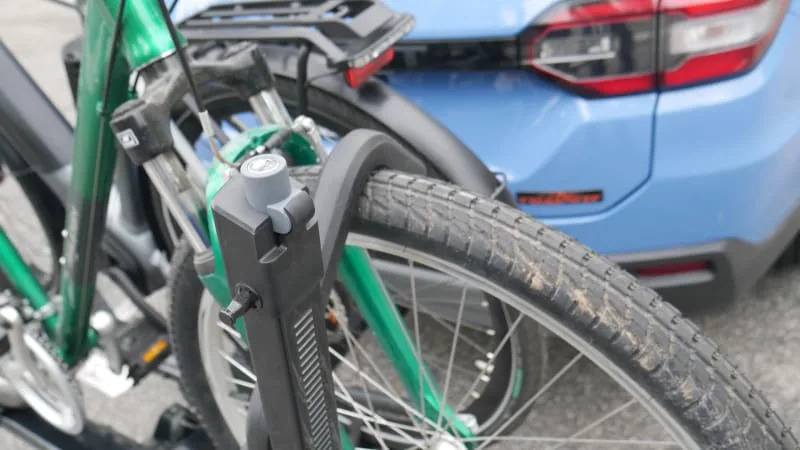
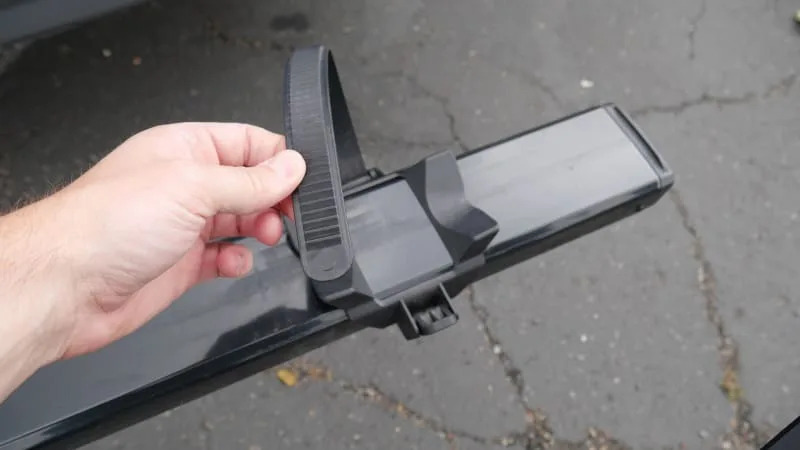
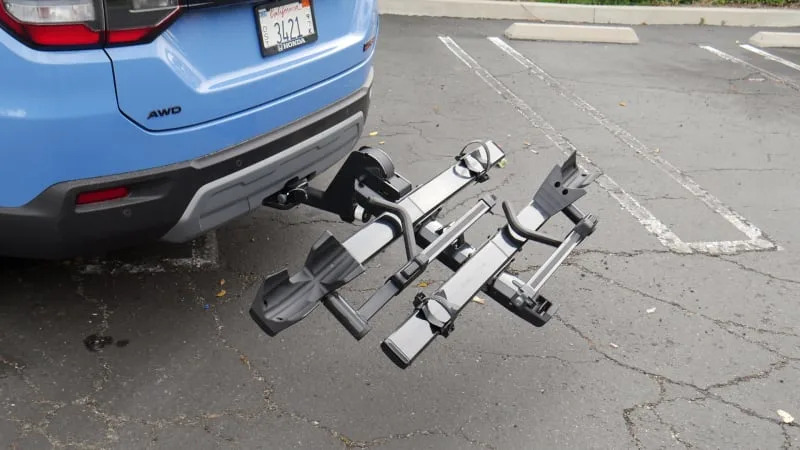
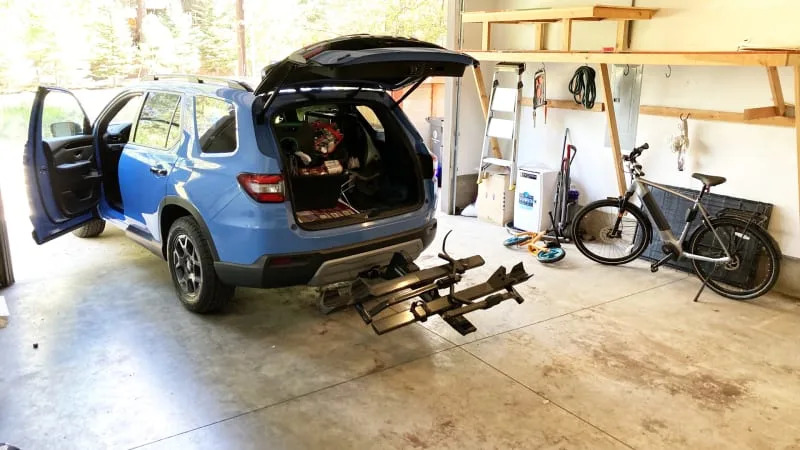
Once out on the road, there’s really nothing that indicated in terms of vehicle dynamics that 121 pounds was dangling off the back of the Pilot. My rearview was obviously filled with a lot of large gray bicycle, and a small slice of the bike’s wheel poked out beyond the bumper. This is because each platform is placed off-center to allow two bikes to fit without interacting, which is an advantage over some other racks. You can, in theory, move the platform so that a single bike rests in the vehicle’s center and won’t be exposed to airflow. I attempted to do this, but the factory-installed bolts in question were not budging.
One element to keep in mind, especially since we’re most likely talking about mountain bikes here, is that the StageTwo is only rated to carry bikes up to 42 pounds each when off-roading. You can see why sudden bumps and drops could add extra strain to the tongue. Even if you did have light-enough bikes, though, your departure angle would be massively reduced with the rack dangling off the back.
I was impressed by the StageTwo and found that it did its job admirably, but of course, this is only one data point. For what it’s worth, Bicycling.com named the StageTwo its top e-bike rated rack choice. A Top 10 list by Ebicycles.com puts four others ahead of it, including Yakima’s own OnRamp, which as the name suggests, features a swing-down ramp that makes loading the bikes much easier. The StageTwo is more capable of accommodating a wider array of bikes, including fat tire and long-wheelbase models, plus kids’ bikes.
The suggested retail price for the StageTwo is typically $749, though sales can bring it down to $599. (The OnRamp is $699, while the entry-level HoldUp model that isn’t as versatile is $499). This, not surprisingly, is more than a regular rack, but also less than competitor racks from Thule and Kuat that, to be fair, have advantages in their own right. Ultimately, the most important thing to remember is this: With an e-bike, you’re gonna need a bigger rack.
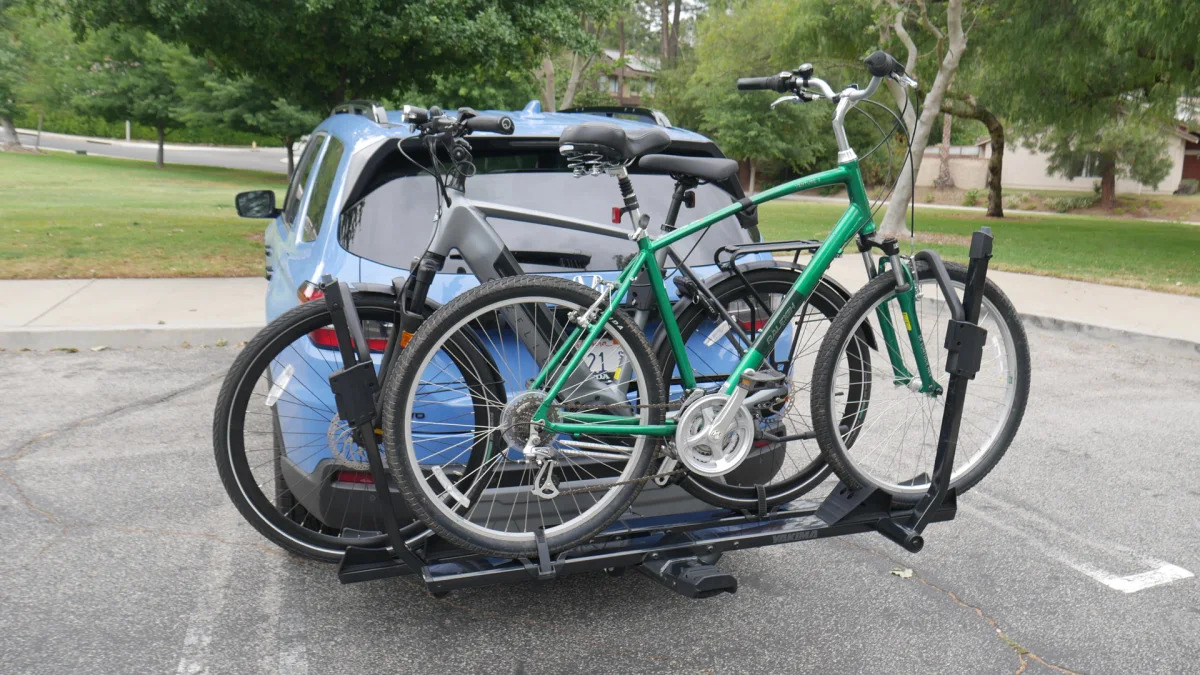





















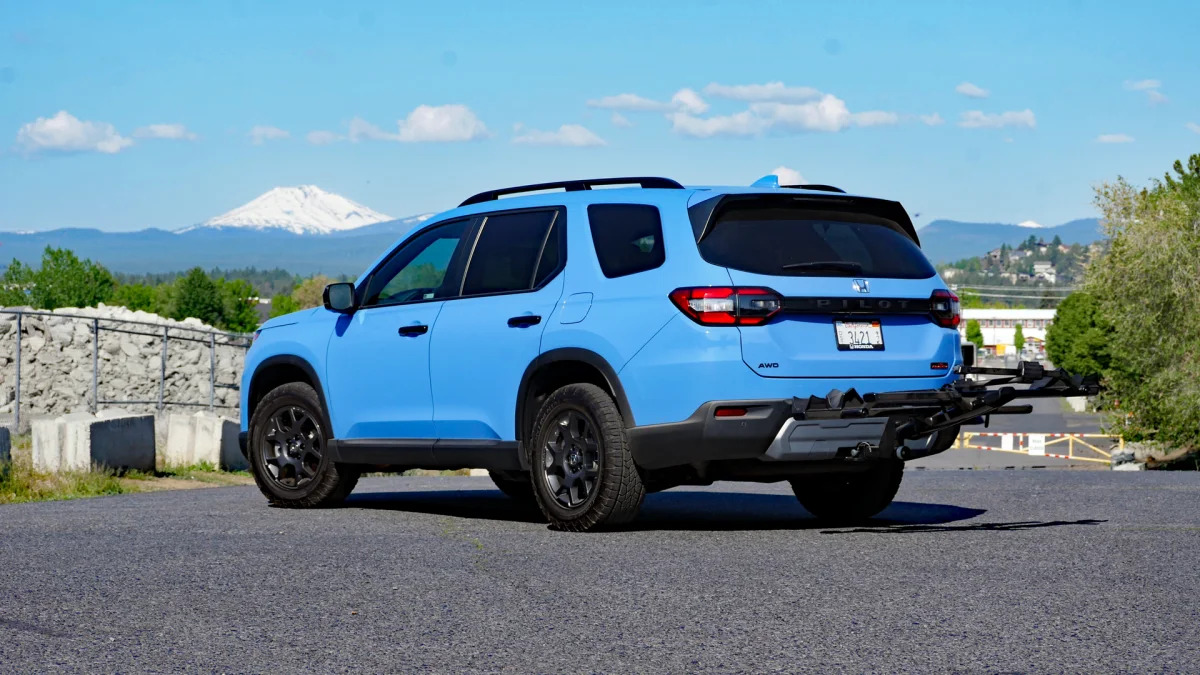

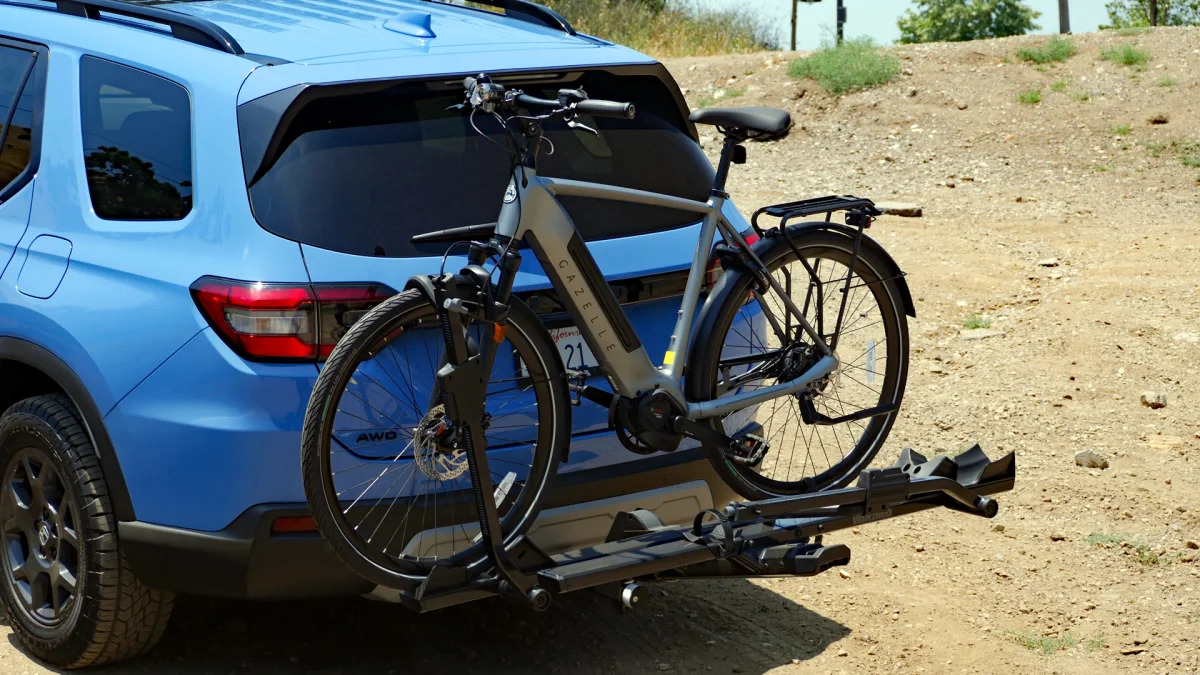

































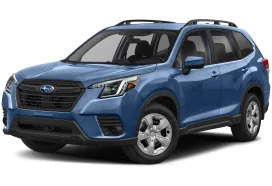
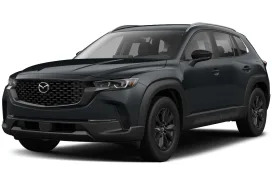
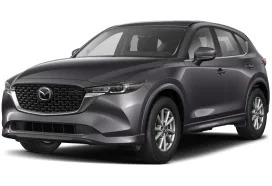

Sign in to post
Please sign in to leave a comment.
Continue